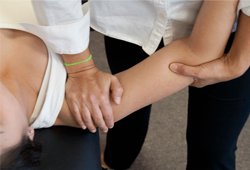Frozen Shoulder Treatment: Physiotherapy Solutions for Faster Recovery
- Nathalie Agius
- Jan 19, 2023
- 3 min read
Updated: Jan 8
What is a Frozen Shoulder?
The shoulder joint is a 'ball and socket' joint enclosed within a strong fibrous capsule. Frozen shoulder, also known as adhesive capsulitis is a condition where this capsule becomes thicker and tighter, causing your shoulder to become stiff and painful. Frozen shoulder effects around 5% of the population and is most common in women aged between 40 and 60.
What causes Frozen shoulder?
Frozen shoulder is thought to develop due to inflammation of the shoulder joint and the surrounding capsule. It is most common when there has been previous damage to the shoulder, such as a rotator cuff tear, or if you've had to keep your shoulder stiff for a long time, such as, after a fracture and post shoulder surgery.

What are the Symptoms of Frozen Shoulder?
There are two main symptoms of frozen shoulder:
A dull or aching pain in your affected shoulder, which is often worse at night or when you move your shoulder joint.
Stiffness around your shoulder joint that may stop you from moving your shoulder normally. This can make it difficult to do everyday tasks such as driving or dressing yourself.
If you experience any of these symptoms talk to your physiotherapist immediately! Early treatment will give the best results!!
Stages of Frozen Shoulder
A frozen shoulder is usually said to develop in several stages, which may overlap.

Physiotherapy for Frozen Shoulder
If you think you have a frozen shoulder, it is advisable to seek the advice of your physiotherapist immediately. The physiotherapist will perform a thorough examination of your shoulder, and will be able to diagnose accordingly. A frozen shoulder may take several years to recover on its own. Getting early treatment to decrease pain and increase movement, may give the best results. The most effective physiotherapy modalities include exercise therapy, manual therapy, and cupping therapy to help reduce pain and stiffness.
In severe cases, your doctor may recommend a steroid joint injection, to help ease the pain, making physiotherapy more comfortable for you. Surgery may be indicated, if all other treatment fails.
For more information or to book an appointment, you’re welcome to get in touch on +356 9921 2441 to discuss how personalized, assessment-led physiotherapy can support your recovery.
All of my blog content reflects how I work with clients in practice — combining hands-on physiotherapy with movement education and evidence-based care. If you’d like to continue learning about pain management, rehabilitation, and moving well in everyday life, explore more expert insights on our main blog page.
References
Effectiveness of Interventions for Primary Frozen Shoulder — Systematic Review: A review of randomized trials comparing physiotherapy, steroid injections, manipulation under anaesthesia, and other treatments for frozen shoulder.https://pubmed.ncbi.nlm.nih.gov/34555926/ PubMed
The Efficacy of Physiotherapy Interventions in Adhesive CapsulitisSystematic review summarizing evidence supporting physiotherapy techniques for pain relief, range of motion improvement, and function in frozen shoulder.https://pubmed.ncbi.nlm.nih.gov/33185587/ PubMed
Manual Therapy and Exercise for Frozen Shoulder — Cochrane SummaryEvidence review on manual therapy and exercise showing outcomes compared with other interventions such as steroid injections.https://www.cochrane.org/evidence/CD011275_manual-therapy-and-exercise-frozen-shoulder-adhesive-capsulitis Cochrane
Management of Frozen Shoulder: Systematic Review & Cost-Effectiveness AnalysisComprehensive assessment of multiple treatment modalities for frozen shoulder, including conservative and surgical options.https://www.ncbi.nlm.nih.gov/books/NBK98000/ NCBI
Physiotherapy of Adhesive Capsulitis — Review ArticleOverview of the clinical presentation, diagnostic criteria, and conservative management strategies for frozen shoulder.https://www.kheljournal.com/archives/2019/vol6issue2/PartA/6-1-51-752.pdf kheljournal.com
Living with Frozen Shoulder — Phenomenological Study Research on the real-world impact of frozen shoulder on daily activities and the role of physical therapy in practice.https://bmcmusculoskeletdisord.biomedcentral.com/articles/10.1186/s12891-022-05251-7 SpringerLink








Comments